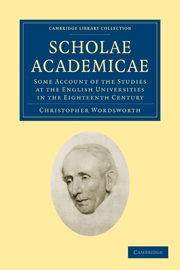 Scholae Academicae
Scholae Academicae Book contents
- Frontmatter
- PREFACE
- Contents
- CHAPTER I GENERAL INTRODUCTION
- CHAPTER II THE TRIPOS, name and thing
- CHAPTER III THE SOPHS' SCHOOLS before 1765
- CHAPTER IV ACTS AND OPPONENCIES after 1772
- CHAPTER V THE SENATE-HOUSE
- CHAPTER VI THE ADMISSION OF QUESTIONISTS. Huddling
- CHAPTER VII THE MATHEMATICKS
- CHAPTER VIII THE TRIVIAL ARTS
- CHAPTER IX HUMANITY
- CHAPTER X MORALS AND CASUISTRY
- CHAPTER XI LAW
- CHAPTER XII MODERN STUDIES
- CHAPTER XIII ORIENTAL STUDIES
- CHAPTER XIV PHYSICK
- CHAPTER XV ANATOMY
- CHAPTER XVI CHEMISTRY
- CHAPTER XVII GEOLOGY AND MINERALOGY
- CHAPTER XVIII BOTANY
- CHAPTER XIX The Degree of M.A.
- CHAPTER XX MUSICK
- CHAPTER XXI ASTRONOMY
- CHAPTER XXII CONCLUSION
- APPENDICES
- i RELLIQUIAE COMITIALES ex codd. Caiensibus ms.tis
- ii LETTERS from Persons in Statu Pupillari at CAMBRIDGE 170⅘—1791
- iii A STUDENT'S GUIDE 1706—1740
- iv Ἐγκυκλоπαιδεία, or A Method of Instructing Pupils, 1707
- v TRINITY COLLEGE EXAMINATIONS
- vi ST JOHN'S COLLEGE EXAMINATIONS (1765—1775)
- vii ANTIQUITIES OF THE TRIPOS LISTS AND CALENDARS
- viii ANTIQUITIES OF THE SCHOOLS from MSS. in Gonville and Caius Coll. (1772—1792)
- ix ANNALS OF THE CAMBRIDGE PRESS
- INDEX
v - TRINITY COLLEGE EXAMINATIONS
Published online by Cambridge University Press: 07 September 2010
- Frontmatter
- PREFACE
- Contents
- CHAPTER I GENERAL INTRODUCTION
- CHAPTER II THE TRIPOS, name and thing
- CHAPTER III THE SOPHS' SCHOOLS before 1765
- CHAPTER IV ACTS AND OPPONENCIES after 1772
- CHAPTER V THE SENATE-HOUSE
- CHAPTER VI THE ADMISSION OF QUESTIONISTS. Huddling
- CHAPTER VII THE MATHEMATICKS
- CHAPTER VIII THE TRIVIAL ARTS
- CHAPTER IX HUMANITY
- CHAPTER X MORALS AND CASUISTRY
- CHAPTER XI LAW
- CHAPTER XII MODERN STUDIES
- CHAPTER XIII ORIENTAL STUDIES
- CHAPTER XIV PHYSICK
- CHAPTER XV ANATOMY
- CHAPTER XVI CHEMISTRY
- CHAPTER XVII GEOLOGY AND MINERALOGY
- CHAPTER XVIII BOTANY
- CHAPTER XIX The Degree of M.A.
- CHAPTER XX MUSICK
- CHAPTER XXI ASTRONOMY
- CHAPTER XXII CONCLUSION
- APPENDICES
- i RELLIQUIAE COMITIALES ex codd. Caiensibus ms.tis
- ii LETTERS from Persons in Statu Pupillari at CAMBRIDGE 170⅘—1791
- iii A STUDENT'S GUIDE 1706—1740
- iv Ἐγκυκλоπαιδεία, or A Method of Instructing Pupils, 1707
- v TRINITY COLLEGE EXAMINATIONS
- vi ST JOHN'S COLLEGE EXAMINATIONS (1765—1775)
- vii ANTIQUITIES OF THE TRIPOS LISTS AND CALENDARS
- viii ANTIQUITIES OF THE SCHOOLS from MSS. in Gonville and Caius Coll. (1772—1792)
- ix ANNALS OF THE CAMBRIDGE PRESS
- INDEX
Summary
Until the present century Trinity was the only college in Cambridge where the fellowships were open without territorial appropriation.
All the other colleges (with the exception of King's) filled up each vacancy by electing if possible some one whose name had been matriculated as belonging to the same county as the outgoing fellow.
The counties were thus distributed for Peterhouse in 1630 (by a statute superseding Warkworth cap. xii.) into north (Boreales) and south (Australes) by a line diawn from Yarmouth to Machynlleth.
Northern. Bedford, Cheshire, Cumberland, Derby, Durham, York, Hunts, Lancaster, Leicester, Lincoln, Norfolk, Northampton, Northumberland, Notts, Rutland, Salop, Stafford, Warwick, Westmoreland, Worcester,—Anglesea, Caernarvon, Denbigh, Flint, Merioneth, Montgomery.
Southern. Berks, Bucks, Cambridge, Kent, Cornwall, Devon, Dorset, Essex, Gloster, Herts, Hereford, Middlesex, Monmouth, Oxon, Southampton, Surrey, Sussex, Suffolk, Somerset, Wilts,– Brecon, Caermarthen, Cardigan, Glamorgan, Pembroke, Radnor.
There might he four fellows at one time from Middlesex or Cambridgeshire, but only one each from any of the others (the whole of Wales counting as one) except by royal dispensation.
If it happened that there was no candidate of the right county ready, the election would I suppose lie between the men of any northern (or southern) counties which had no representatives in the existing body of fellows.
In 1785, Henry Gunning did not enter at S. John's because Cambridgeshire was filled by the bishop of Ely's fellow, and a professor's son, already admitted, was prepared to step into his shoes.
- Type
- Chapter
- Information
- Scholae AcademicaeSome Account of the Studies at the English Universities in the Eighteenth Century, pp. 343 - 351Publisher: Cambridge University PressPrint publication year: 2009First published in: 1877
